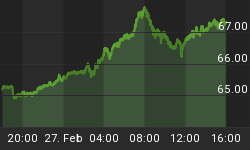Nouriel Roubini appeared on "Bloomberg Surveillance" with Tom Keene todayand said that U.S. growth will be "barely 1.7%" in 2013.
Roubini also said that "there's a highly likely chance we're going to go over the cliff. If we do so, the market reaction is going to force the two sidesto reach an agreement."
Roubini on whether he's bullish on the United States:
"In the long term, I think that the fundamentals of the U.S. are a lot stronger than other advanced countries. In the short run I think we will have another year of very anemic economic growth. Next year we will have barely 1.7% including a modest amount of fiscal drag and lots of tail risk could make it worse in the U.S--bigger fiscal cliff, the euro zone crisis, a Chinese hard landing, maybe tensions will raise oil prices in the Middle East--so the downside scenario is actually having a meaningful probability."
On whether he's convinced there's a U.S. housing recovery:
"I do believe there is a housing recovery but I think that those that are more optimistic about it are going to be proven wrong next year. Housing can increase say 10 to 15% in real terms of residential investment but at the peak it was 6% of GDP, right now it's only 2% of GDP, so the direct effect on GDP growth is going to be very small."
On what he's encouraged by in the U.S. economy:
"There are some positives. There's a housing recovery, shale gas revaluation, some reshoring of manufacturing, some job creation, QE3 is going to help. But even in a scenario where we avoid the cliff, we expect there will be a fiscal adjustment of 1.4% of GDP next year...My best scenario for the U.S. is 1.7% growth for next year..."
On what legislative process he'd like to see in Washington:
"Unfortunately, in the U.S. we have a system of balance of powers between executive and legislative and even the courts and right now we have to make tough choices and we have gridlock. Republicans are vetoing tax increases and Democrats don't want entitlement reform. People talk about the cliff, but there are several things. There's the issue about the budget in 2013, then there will be the debt ceiling debate, another debate about medium term fiscal consolidation, within that we will have a debate about fundamental tax reform and then we have entitlement reform."
On whether the U.S. will go over the fiscal cliff:
"I think there's a highly likely chance we're going to go over the cliff. If we do so, the market reaction is going to force the two sides to reach an agreement. But even if you reach an agreement you will have a 1.25% drag on growth in an economy that is barely growing."
On whether he'd take the position of Treasury Secretary if Obama were to call on him:
"He is not going to call on me. There are great people out there. I was in politics, it was two great years, but I think as a public intellectual, I can provide input to the debate where I am now."
On Europe's recession:
"It's continuing and spreading to parts of the core like France. Even Germany is slowing down because its two major markets--the periphery of the euro zone is contracting and Asia and china are slowing down, so there's a euro zone recession. It's fed by fiscal austerity continuing, fed by strong euro and fed by credit crunch in the banks of the periphery and lack of consumer and business confidence. So we'll have another recession next year throughout the euro zone."
On whether the European recession will weigh on the rest of the world:
"It does, for example, some of the slowdown of exports in china is outright contraction of the periphery of the euro zone. The euro zone overall is as large as the United States in terms of GDP almost. Therefore what happens in the euro zone matters for Latin America, Asia and so on."
On the challenges Europe has besides slow growth, corruption, inefficiencies, demographics:
"There are short-term problems that are those of a recession--lack of economic growth, vulcanization of the banking system, vulcanization of public debt markets. But then it is also a part of the world where aging is occurring more rapidly than the United States so potential growth is low. It is also a part of the world where structural reform has not occurred so therefore productivity growth is low. So we have low potential growth and high debt radio and that dynamic could be in a situation where, not just in Greece but in other countries, are going to have unsustainable debt burdens."















